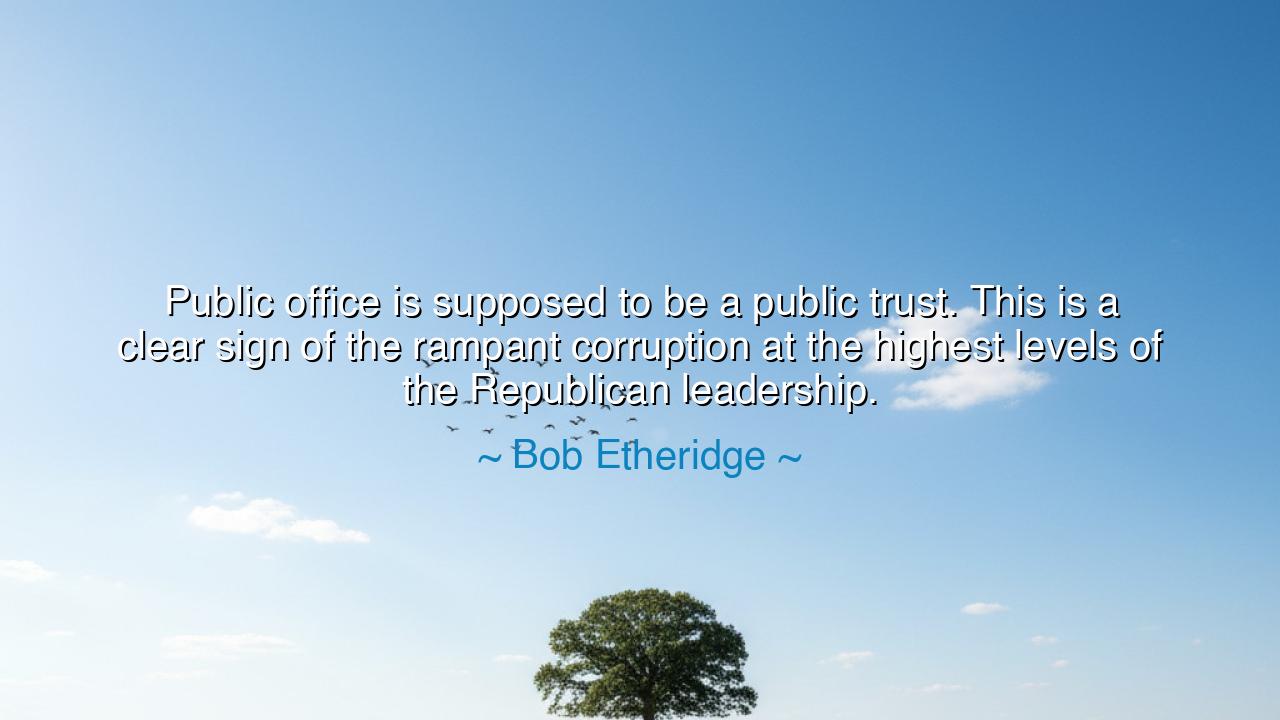
Public office is supposed to be a public trust. This is a clear
Public office is supposed to be a public trust. This is a clear sign of the rampant corruption at the highest levels of the Republican leadership.






Hear the grave words of Bob Etheridge, spoken not only to his own age but to all ages: “Public office is supposed to be a public trust. This is a clear sign of the rampant corruption at the highest levels of leadership.” In this saying lies a reminder of the sacred covenant between rulers and the ruled, between the entrusted and those who entrust. For public office is not meant to be a throne of privilege, but a burden of responsibility, a guardianship held on behalf of the people. When it is betrayed, the very foundation of society trembles.
The ancients knew this well. In Rome, the republic endured only so long as its magistrates remembered that their power was a gift of the people, not a possession of their own. But when ambition overtook duty, when men like Sulla and later Caesar sought to bend the republic to their private will, corruption rotted the heart of the state. What had been a public trust became a personal prize, and Rome fell into tyranny. Thus Etheridge’s words echo across centuries: betrayal of trust at the top is the herald of decline.
Consider also the example of George Washington. He could have crowned himself king after victory in the Revolution, for the army would have followed him. Yet he refused, laying down his power, teaching the world that public office is a sacred loan, not a private inheritance. His restraint preserved liberty for his nation. Contrast this with leaders who hoard office, enrich themselves, and exploit their stations—such men turn public trust into corruption, and their names are cursed in memory.
Etheridge’s warning is not confined to one party, nor to one time. It speaks to the eternal danger of corruption, which festers when power is unchecked and when those entrusted forget their duty to the people. Whenever rulers serve themselves instead of the common good, betrayal spreads like a plague. The people may grow weary, cynical, and despairing, but history teaches that such betrayal always carries a cost. Trust, once broken, breeds rebellion, collapse, or decay.
This truth is also a call to vigilance. For citizens, too, bear responsibility. If they sleep, if they cease to demand accountability, if they accept corruption as inevitable, then they become accomplices in their own betrayal. But if they rise, demand justice, and insist that leaders treat public office as a sacred trust, then the republic is preserved. A people who cherish truth and honor cannot be ruled by the corrupt for long.
The lesson, then, is clear: leadership is service, not dominion. Those in office must live as stewards, not as kings. They must measure their deeds not by gain for themselves, but by good for the people. And those who follow must watch carefully, reward integrity, and condemn betrayal. Only in this balance can trust endure, and only in trust can freedom survive.
What then must you do? Be vigilant. Learn the ways of your leaders. Do not be blinded by their words—watch their deeds. Support those who honor their public trust, and resist those who betray it. Demand accountability, cherish integrity, and remember that liberty is not preserved by silence, but by courage.
Thus remember Etheridge’s words: “Public office is supposed to be a public trust… corruption at the highest levels of leadership is a sign of danger.” Let them be written in your heart as both warning and guide. For no nation stands forever unless its leaders are just, and no people remain free unless they guard the trust that binds them together.






AAdministratorAdministrator
Welcome, honored guests. Please leave a comment, we will respond soon